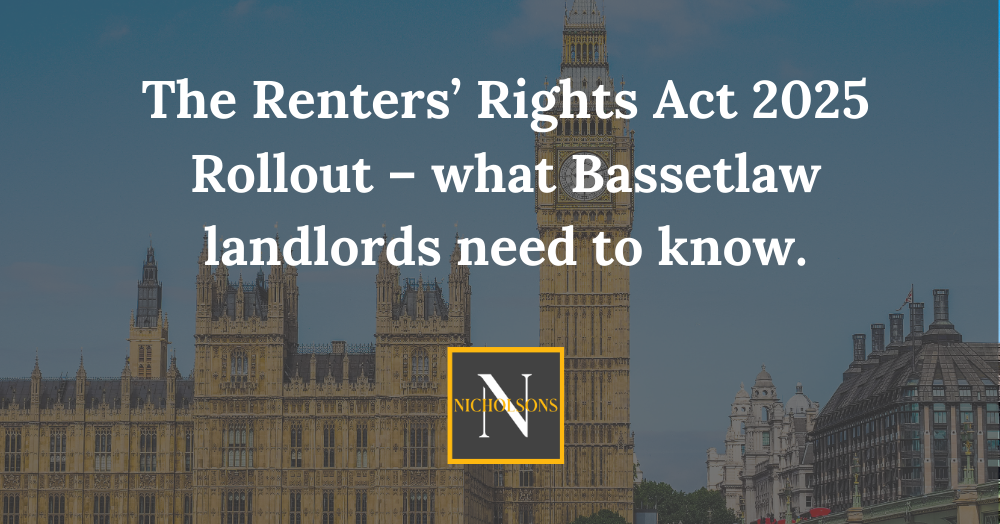The Renters’ Rights Act 2025 Rollout – what Bassetlaw landlords need to know.
From Royal Assent in October 2025 through to the “big switch-on” in May 2026 and beyond, the Renters’ Rights Act is going to reshape the way you let property in Bassetlaw.

- protect your investment
- keep you compliant
- minimise voids and stress
The key dates at a glance
- 27 October 2025 – Renters’ Rights Bill receives Royal Assent and becomes the Renters’ Rights Act 2025.
- Late December 2025 – first changes go live, mainly stronger investigatory and enforcement powers for local authorities.
- 1 May 2026 – major tenancy reforms in the private rented sector in England start together on a single “big bang” date:
- Section 21 ‘no-fault’ evictions abolished
- Fixed-term assured shorthold tenancies withdrawn and replaced by open-ended assured periodic tenancies
- New, updated grounds for possession
- Rent increases capped at once per year, with a right for tenants to challenge
- Ban on rent bidding and limits on rent paid in advance
Protections against discrimination (for example, tenants on benefits or families with children)
- Clearer rules around pets
- From late 2026 onwards – phased rollout of:
- A national Private Rented Sector (PRS) Database – all landlords and rented properties must be registered
- A mandatory PRS Landlord Ombudsman scheme
- Into the 2030s (dates to be confirmed) – further measures including:
- A Decent Homes Standard for the PRS
- A push towards a minimum EPC C for rented homes by 2030, subject to exemptions and final regulations
- Stronger time limits and expectations around dealing with serious hazards such as damp and mould (“Awaab’s Law”-style protections)
What actually changes for you on 1 May 2026?
1. No more Section 21 “no-fault” notices
- Selling the property
- Moving back in yourself or housing a close family member
- Serious rent arrears
- Persistent late payment
- Anti-social behaviour or serious breach of tenancy
2. All tenancies become open-ended
- Tenants will generally be able to leave with two months’ notice.
- You’ll use the new possession grounds if you need the property back.
3. Rent increases – once a year, with checks
- You’ll be limited to one rent increase every 12 months.
- Increases need to be reasonable and aligned with market rent – tenants will have more scope to challenge unfair rises.
4. No bidding wars & limits on rent in advance
- A ban on rental bidding – you market at a set price and can’t invite or accept offers over that figure.
- A cap on rent in advance – typically limited to one month upfront, alongside the tenancy deposit.
5. Stronger protection around discrimination & pets
- Refuse a tenant just because they receive benefits
- Blanket-ban families with children
- Automatically refuse reasonable pet requests without proper consideration
From late 2026 – the landlord database and ombudsman
Private Rented Sector Database
- Register yourself as a landlord
- Register each rented property, likely with an annual fee
- Upload key compliance information (EPC, gas and electrical safety, and so on)
PRS Landlord Ombudsman
- A free-to-use complaints service for tenants
- A way to resolve issues without going straight to court
- Another reason to keep your paperwork, processes and communication spot-on
The longer view – Decent Homes, EPC C and Awaab’s Law
- A formal Decent Homes Standard for the PRS – bringing private rentals closer to social housing standards.
- A requirement for most rented properties to reach around EPC C by 2030, unless a valid exemption applies.
- Extending Awaab’s Law-style timescales to the PRS – meaning faster responses to serious hazards such as damp and mould, dangerous electrics and other health risks.
What should Bassetlaw landlords be doing now?
1. Review your current tenancies and documents
- Check your existing ASTs, notice clauses and rent review clauses.
- Make sure your referencing, “How to Rent” documents, gas/electrical/EPC certificates and deposit protection are all up to date and properly filed.
- Start planning how you’ll move to periodic-style tenancy management from May 2026.
2. Stress-test your numbers
- Benchmark your property against real achieved rents in Retford, Worksop and the surrounding villages
- Build in a sensible, sustainable rent strategy that protects yield without risking voids or disputes
3. Tidy up property condition now
- Deal with niggling repair issues you’ve been putting off
- Get ahead on damp and mould, ventilation and heating checks
- Look at the steps you’ll need to take to work towards EPC C by 2030, especially on older homes
4. Decide how “hands-on” you want to be
- Let-only – for landlords who want us to find and thoroughly vet the tenant, then manage the tenancy themselves.
- Full property management – a comprehensive service where we and our specialist partners take care of everything, from marketing and viewings to maintenance, renewals and compliance monitoring.
How Nicholsons can help you prepare
- Updating all of our tenancy documentation and processes for the new regime
- Running one-to-one reviews with our managed landlords to check readiness
- Sharing plain-English guides and local updates as more detail is released



